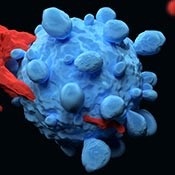
Judith Varner, PhD
Professor, UC San Diego School of Medicine
Research into cancer’s ability to suppress the immune response has extraordinary potential to inform novel therapeutic approaches that stimulate anti-tumor immunity. An interdisciplinary approach that incorporates these methods along with checkpoint inhibitors, traditional radiation and biologic therapies may lead to new approaches for treating head and neck cancers. Funding for this project was generously provided by the Kimmelman Family and the V Foundation for Cancer Research.
The Need
Head and neck squamous cell carcinoma (HNSCC) is rapidly overtaking other cancer types as one of the most deadly in the world, due in part to increasing rates of human papillomavirus (HPV). HNSCC is both disfiguring and deadly, with a one-year survival rate of only 36 percent. Targeting tumor-associated macrophages (TAM) has shown significant progress in reducing tumor cells’ ability to suppress the immune response and encourage tumor growth.
The Opportunity
Judith Varner, PhD, and her team have identified proteins, called myeloid cell integrins, which encourage tumor cell growth and immune suppression. During research, interrupting these proteins with a checkpoint inhibitor activated CD8+ cells and eliminated 90 percent of HPV-related tumors in models. This led Dr. Varner to conclude that macrophages promote immune suppression in HNSCC and that targeting these cells may improve outcomes in individuals with this kind of cancer.
These findings will be translated into animal models to determine whether myeloid cell integrins can induce T cell memory and identify ways to regulate cancer development. Dr. Varner’s research will also help identify novel therapeutics that reduce immune suppression and uncover immune biomarkers for HNSCC.
The Impact
Research into cancer’s ability to suppress the immune response has extraordinary potential to inform novel therapeutic approaches that stimulate anti-tumor immunity. An interdisciplinary approach that incorporates these methods along with checkpoint inhibitors, traditional radiation and biologic therapies may lead to new approaches for treating head and neck cancers.